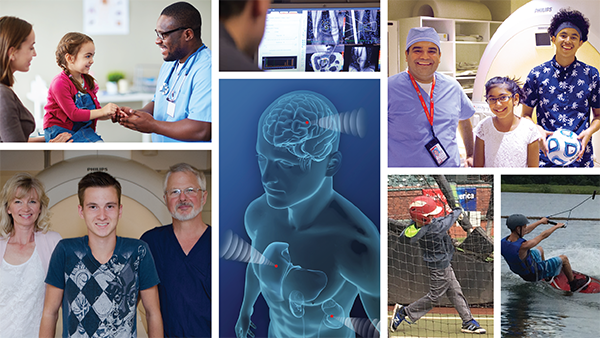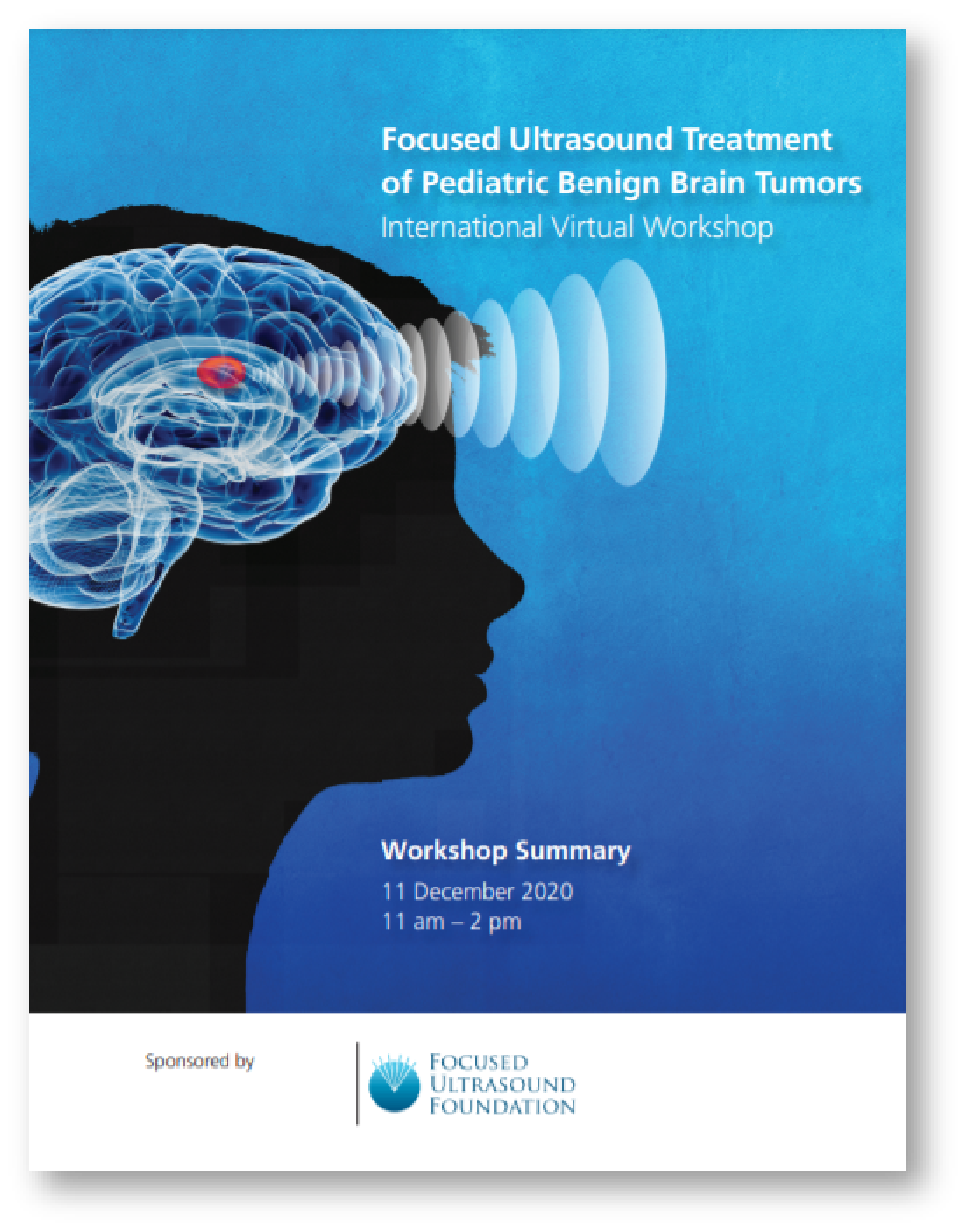Key Points
- The field of focused ultrasound for pediatrics celebrated two milestones in the past year: the Foundation designated its first pediatric Center of Excellence, and the FDA approved focused ultrasound therapy for the first pediatric condition.
- Learn about the current clinical trials available for these young patients.
- The Foundation hosted a Pediatric Benign Brain Tumor Workshop to discuss using focused ultrasound to treat these difficult tumors.
- We established a Scientific Advisory Board of experts to create a roadmap forward for all pediatric applications.
The Foundation’s pediatrics program has been galvanized by two major milestones occurring in late 2020:
 In September 2020, the Foundation named Children’s National Hospital in Washington, DC, its first pediatric Center of Excellence. This designation will foster and encourage research into the pediatric oncological applications of focused ultrasound, particularly to augment targeted chemotherapy and immunotherapy for hard-to-treat pediatric cancers.
In September 2020, the Foundation named Children’s National Hospital in Washington, DC, its first pediatric Center of Excellence. This designation will foster and encourage research into the pediatric oncological applications of focused ultrasound, particularly to augment targeted chemotherapy and immunotherapy for hard-to-treat pediatric cancers.- In addition, the US Food and Drug Administration (FDA) approved the Profound Medical Sonalleve device for treating osteoid osteoma (OO) in November 2020. This is the first US regulatory approval for an indication that occurs primarily in children and young adults. Focused ultrasound treatment of OO also has regulatory approval in Europe, Russia, and China.
“These milestones are significant achievements on the journey to accelerate focused ultrasound for the pediatric patient population,” said Foundation Chairman Neal F. Kassell, MD. “With more evidence from innovative research projects and subsequent regulatory approvals, we believe that focused ultrasound will be a highly effective, noninvasive treatment option for children suffering from cancer and a variety of medical conditions.”
During a recent virtual fireside chat, Suzanne LeBlang, MD, the Foundation’s Director of Clinical Relationships and scientific lead of the pediatrics program, provided an update on these developments and more. Watch the Recording >
State of Clinical Research
The advantages of focused ultrasound over other treatment modalities are especially appealing to the field of pediatrics. Focused ultrasound is completely noninvasive and thus has the potential to reduce stress and trauma from surgery. It involves no ionizing radiation, and it may offer an alternative to existing treatments that can be associated with scarring and disfigurement from current surgical procedures. Focused ultrasound may also lead to improved efficacy by increasing targeted drug delivery of various medications to a variety of diseases such as brain tumors, sarcomas, desmoid tumors, and bone tumors.
Pediatric focused ultrasound clinical trials that are ongoing or have recently completed enrollment use thermal ablation for bone metastases, benign brain tumors, and pediatric solid tumors such as sarcomas, neuroblastomas, and Wilms’ tumors. Additionally, there is a clinical trial that is exploring a different focused ultrasound mechanism of action involving drug delivery of thermosensitive doxorubicin in pediatric solid tumors that have been refractory to traditional treatment.
Bioengineering teams from Children’s National Hospital and Virginia Tech are partnering on a new brain tumor research collaboration at the Children’s National Research & Innovation Campus. One of the aims is to accelerate research and the clinical applicability of focused ultrasound in children with brain tumors, especially diffuse intrinsic pontine gliomas (DIPGs), highly aggressive and difficult to treat brain tumors found deep in the brain with a 90% mortality rate at two years.
Innovation in the Laboratory
There are many preclinical laboratory studies examining various pediatric uses of focused ultrasound. Researchers are investigating the technology to enhance various drug delivery models for neuroblastoma and DIPGs. Others are studying its ability to break up blood clots from intraventricular hemorrhage, a common cause of morbidity and mortality in premature infants. Focused ultrasound is also being used to deliver and deploy nanoparticles bearing CRISPR gene editing tools into specific tissues with much higher efficiency, an approach which has the potential to revolutionize treatment for a variety of conditions, including spinal muscular atrophy.
Foundation Focuses on Pediatric Brain Tumors In 2020, the Foundation launched a five-year, $60 million campaign, of which at least $3 million will be directed to pediatric research projects.
In 2020, the Foundation launched a five-year, $60 million campaign, of which at least $3 million will be directed to pediatric research projects.
In December, the Foundation organized a Pediatric Benign Brain Tumor Workshop, which convened 20 clinician experts with industry leaders and representatives from the FDA to outline current practices in the treatment of benign pediatric brain tumors, discuss a current focused ultrasound clinical trial at Nicklaus Children’s Hospital in Miami, Florida, and determine a roadmap for advancing the use of focused ultrasound to treat these difficult tumors. The white paper from the workshop is now available.
Looking ahead, the Foundation is planning a virtual workshop in summer 2021 to convene leading investigators to drive innovation and overcome barriers to determine how focused ultrasound could improve treatment outcomes in more malignant pediatric brain tumors such as DIPG.
Leading the Charge
The Foundation’s pediatric program will be guided by a Scientific Advisory Board composed of leaders representing a variety of pediatric subspecialties who will advise the Foundation on creating a roadmap to advance the field. Board members include:
- Anne Marie Cahill, MBBch, BAO, Chief of the Division of Interventional Radiology, Children’s Hospital of Philadelphia, Philadelphia, PA
- AeRang Kim, MD, PhD, Associate Professor of Pediatrics, Children’s National Hospital, Washington, DC
- John Ragheb, MD, Director of Neurosurgery, Nicklaus Children’s Hospital, Miami, FL
- Steven Yung, MD, Pediatric Critical Care Medicine Attending, Maimonedes Medical Center, Brooklyn, NY*
*Ad hoc
If you are interested in getting involved in the Foundation’s pediatric program, please contact Jessica Lukens.
